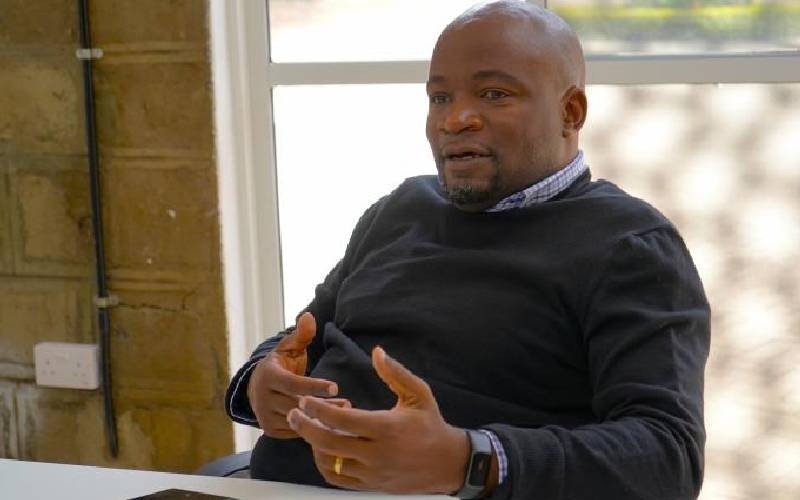
Agosta Liko, the co-founder of Pesapal, a payment service provider, says he failed his exams at Moi University "supremely."
And a chorus of laughter explodes in the boardroom where we are doing the interview in Nairobi. "Wacha kucheka (stop laughing)," he tells his colleague.
Of course, Liko can afford to comically reminisce on such discomfiting moments.
After all, he is running one of the fastest-growing point-of-sale (PoS) providers in East Africa. And he insists that unlike many start-ups in Africa, including many that proudly wear the tag of a unicorn (a start-up with a valuation of over $1 billion (Sh121 billion), his company is profitable.
Profitable?
Yes, the holy grail of any business, Liko insists, is profitability. They are profitable, though he will not reveal the profit, revenues or expenses of Pesapal.
And, yes, they are not a unicorn yet. But that is less of his concern.
His concern, he says, is retaining the 30,000 merchants that they have, mostly in the hospitality industry.
Having 30,000 merchants translates into a huge chunk of a market whose other major players are banks.
Data from the Central Bank of Kenya (CBK), which regulates Pesapal and other PSPs, shows that by end of September, there were 49,786 PoS machines.
This means that for every ten PoS machines in Kenya, six belong to Pesapal. In the month under review, there were 4,063,766 transactions on PoS machines valued at Sh20.5 billion.
Of course, this pales in comparison to mobile money payments which were valued at Sh674.5 billion, but it is a market that Liko believes will keep growing.
Pesapal, which also does e-commerce services, has a presence in Kenya, Uganda and Tanzania. It has plans to move into other markets in the region.
Unlike many start-ups that gobble up venture capital funds and then aggressively expand as they look for a bigger market share, Pesapal is playing the long game by growing revenue and keeping the costs low. Profitability is their only goal.
"Our problem is that we take time. We look at the problems we can fix. And we have been playing the long games as Pesapal or as a business," says Liko.
The founding
Pesapal, like so many other innovative ideas, is an accidental product.
The firm was founded by Liko and his college mate Onesmus Kagwanja. When Liko was in first year at Moi University, Onesmus was in his fifth year. Liko used to rent computer time in Onesmus' dormitory. And that is how they met.
Two years later, when Liko needed an internship, it is Onesmus who gave him an opportunity at a company called Turnkey where he says he was a "horrible" programmer.
He failed his exams and left Turnkey for the US. And when he came back after staying in the US for seven years, he called his friend and asked him to start a software company.
It is this software company that would later on give them the money to build and grow Pesapal. In 2009, the two built a travel website where anyone abroad could come and research easily about Kenya or East Africa, find a holiday package, buy the package and then visit.
But after building the platform, they could not get a payment provider.
At first, they opened an account on a payment service product by Google.
But when money came through, Google shut down the account.
It was a risk to Google, and they just could not understand why someone could pay them so much money. Their explanation that they were a platform for people travelling into Kenya fell deaf ears.
They did the same on Pesapal. And, again, they were shut down.
Getting it right
They went and opened another company in the US. In the first transaction, they said the money is going to Africa for Safari. They were shut down. Again.
"Then I was angry, but now I understand why that decision was made. Because you want to know who is your merchant? Where are they?
In case service is not rendered, what recourse do you have?"
They were middlemen who kept a commission of 3.5 per cent for every money paid by a traveller, and the rest goes go to a tour operator. "So if that tour operator does not deliver, then there is a problem."
This was not just an upset for the budding tech-preneurs, it was a critical learning curve that helped them set what today is one of the fastest-growing PoS providers.
Funding headache
Funding never came by easily. It took them 10 years to get a bank loan.
Yes, they got angel investors in 2010 and 2011 who helped them build the infrastructure, including fraud management, but for a while, they relied on the revenues from the software company.
And with the benefit of hindsight, the lack of financing from venture capital, for example, was in itself a blessing in disguise.
The allure of being a unicorn is a false one. It is pure perception, according to Liko. "Every company that you have been told is an African fintech that is unicorn is loss-making. And that is a fact."
He maintains that this aggressiveness to increase presence is what people have done very successfully to look big. "And when you raise a lot of money, you have a lot of money to do PR (public relations), sponsor big conferences etc. Then you say you are a unicorn, but you have no profit. You are just market share."
That is why a lot of start-ups are laying off people, after years of losing money in the name of acquiring market share, he notes. "But this has been enabled by venture capital. People who are giving money to start-ups and saying grow, grow, grow, add countries. Why?" "If you are in 30 African countries, when Google comes, they will buy you," continues Liko.
Keep costs low
Pesapal's strategy is first to try to earn money and second to keep their costs low. In short, don't spend what you don't have, advises Liko. "We might not have the fanciest office in Nairobi, but we have the best technology. Why? Because we know how to hire talented people and how to work with them for a very long time." Pesapal does PoS and e-commerce in what they describe as a value-plus strategy or payment-plus strategy. For example, if you make an order from a restaurant's website, the order travels through Pesapal's infrastructure and lands directly in its kitchen.
They started when there was no word called fintech or it had not become that big to the point that they are not considered to be a fintech. "We try to maintain profitability. We do not have tons and tons of investor money to tell us to go into forty markets and we will figure out the profit later," says Liko.
High volumes
The firm has 300 staff spread across three countries. But the bulk of the staff is in Kenya This is a low-margin, high-volume business. They target merchants processing over 250,000 transactions in a month.
That is not your typical mama mboga, who has also already been taken care of by M-Pesa and other mobile money payment services. "No one is going to buy vegetables from mama mboga using a PoS, that is a low-volume business."
"That means you can't go to merchants and be given a stupid price where you are making losses," says Liko.
However, when you send money to a till number it appears on the terminal. A merchant is able to receive for M-Pesa or even a card. And soon, for cash as well.
Moreover, they have other platforms such as Ticket Sasa which have higher margin opportunities. They also have products like reserve pots which will help hotels to automate their booking.
 The Standard Group Plc is a multi-media organization with investments in media
platforms spanning newspaper print
operations, television, radio broadcasting, digital and online services. The
Standard Group is recognized as a
leading multi-media house in Kenya with a key influence in matters of national
and international interest.
The Standard Group Plc is a multi-media organization with investments in media
platforms spanning newspaper print
operations, television, radio broadcasting, digital and online services. The
Standard Group is recognized as a
leading multi-media house in Kenya with a key influence in matters of national
and international interest.

